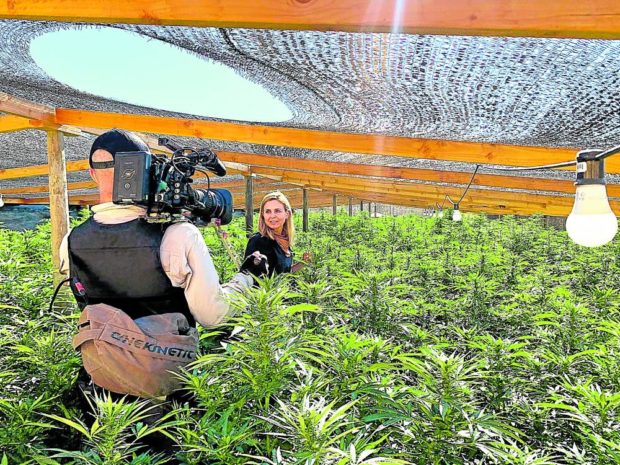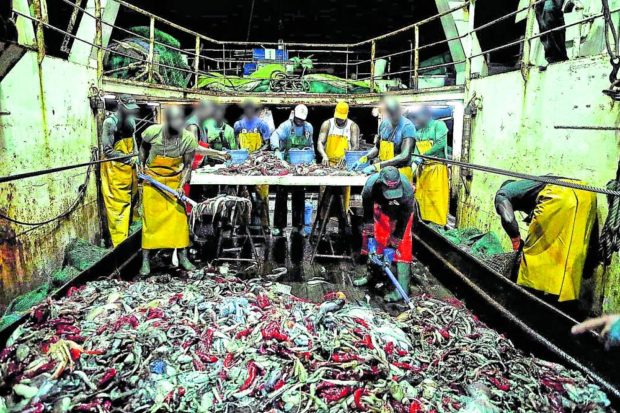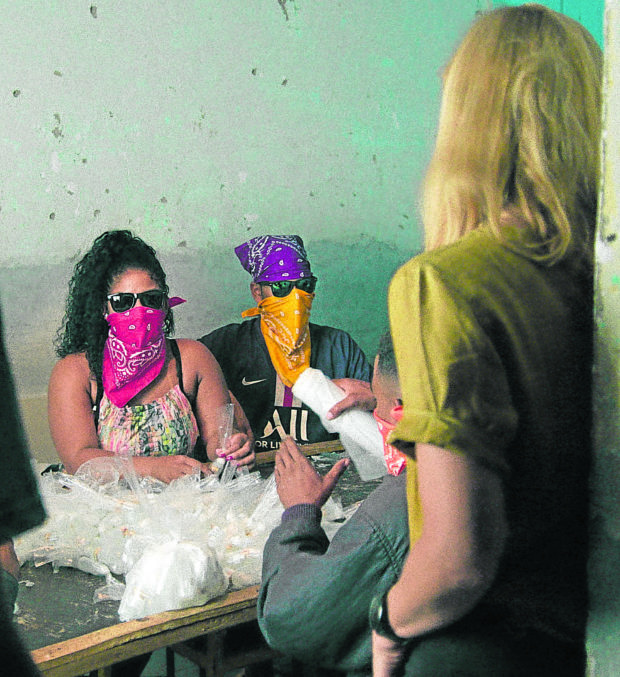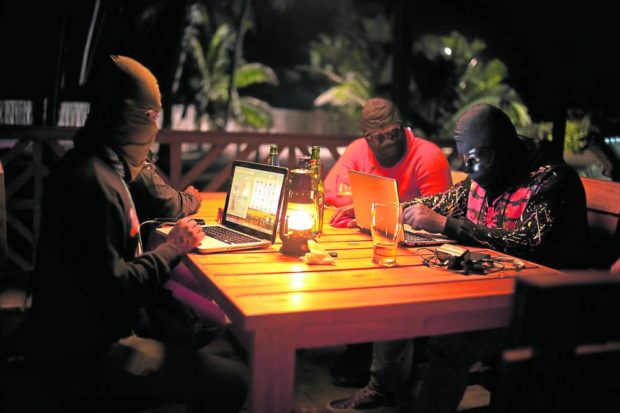‘Trafficked,’ Season 2: Mariana van Zeller goes deeper into the world of scammers, crime syndicates

Mariana van Zeller in the “Black Market Marijuana” episode of “Trafficked” —PHOTOS COURTESY OF NATIONAL GEOGRAPHIC
The danger is real, indeed. Merely hours after our one-on-one interview with Peabody-winning journalist Mariana van Zeller about her must-see National Geographic documentary series “Trafficked” that came out on Jan. 19 last year, we received an urgent request from her team to replace certain photos with another set for reasons we can’t disclose here.
But the dangers Mariana faces every time she goes after her stories are risks she’s willing to take to lift the lid on the world of scammers, goons, traffickers and crime lords of all forms, shapes and sizes lurking at every corner of the world just waiting for the next gullible person to victimize.
So, you can imagine how happy we were to hear NatGeo’s lovely US-based Portuguese correspondent greet us virtually when we “met” her again last month to talk about Season 2 of “Trafficked,” which premieres at 11 p.m. on Friday.
For the ever-growing followers of Mariana, we’re happy to announce that the network has just given Season 3 of her top-rated series the go signal.
“Trafficked with Mariana van Zeller,” with 10 parts for Season 2, continues its host’s harrowing exploration into the underworld’s most dangerous black markets.
Article continues after this advertisementTo give you an idea how exciting the latest season would be—yes, we’ve seen most of it already—viewers will see how the underworld’s evolving black market surgery, marijuana, outlaw motorcycle clubs, methamphetamines, white supremacists, stolen cars, cocaine queens, Amazon mafia, fish pirates and romance scams operate. To say the least, you don’t want to miss it!
Article continues after this advertisement
Men working on deck in an episode on illegal fishing
Multitrillion-dollar economy
Armed with NatGeo’s trademark inside access, each episode follows Mariana as she works her way inside a different black market or a global trafficking network, where she meets the players and learns the business in an effort to understand the inner workings of the world’s multitrillion-dollar shadow economy.
“Filming a whole season of ‘Trafficked’ during a global pandemic was extremely challenging,” she admitted. “But there’s been an explosion of black markets over the past year, and we all quickly realized that this series has become more relevant than ever.”
Asked how different Season 2 will be compared to Season 1, and how much “trouble” she had to hurdle to pull it off, Mariana first replied with hearty laughter, “Season 2 is even better,” she assured us. “It’s actually super challenging when you have a Season 1 that was quite successful—and, as you saw for yourself, that was already crazy!
“I’d say it is by far the most difficult show to put together on TV, I’m quite sure of that. So with Season 2, I wanted to take it a step further. But I am so proud of my team because I do think that we really rose to that level as we went deeper into these black markets.
“And we went ‘wider’ as we approached subjects that, at first glance, we initially didn’t think would fit into a black market—like white supremacy. But if you just scratch the surface, you realize that they do!”

Preparing the “merchandise” in an episode about “cocaine queens”
Our Q&A with Mariana:
I remember getting really scared for you in Season 1 when you backpacked on a mountain in Peru with the drug-peddling muchileros, the so-called “sherpas of the cocaine world,” as well as when a Jamaican goon scamming American retirees admitted that he was initially planning to rough you up. Did you have similar experiences this time around, because you even have more episodes this time around?
Yeah, that’s really par for the course when you operate in black markets surrounded by men with guns—that’s 100 percent. In one situation, we spent months filming the episode about the “cocaine queens,” about women in the narco trafficking world.
It took us a long time to try to gain access to one of the leaders of Los Caparros, a narco trafficking organization in Colombia. After many months, we were finally allowed into her compound, where she’s surrounded by AK-wielding bodyguards.
But within minutes after we started talking to her, we heard their walkie-talkies going crazy. The bodyguards were panicking. We heard that there was a rival group that was coming to ambush them! So, they grabbed and took her into safety, then they started yelling at us to leave, saying it wasn’t safe.
We drove out of there super fast, but we could hear fires being shot behind us as we were leaving. We were incredibly close to being in a very, very dangerous situation.

Masked Ghanaian perpetrators of romance scams.
Your shows give viewers ringside seats to your adventures. How an operation turns out is hard to predict, but which of the episodes was most satisfying for you?
That’s a good one. One of the beautiful things about the real world is that no matter what assumptions you might have of it before you leave, it usually is so much wilder than you ever expected.
So, with the stories of these traffickers, scammers and smugglers, you quickly realize that they’re really much more complex as soon as you hit the ground. Thankfully, we do not live in a black and white world—it’s a world full of color! With every story as a journalist, you have to allow it to change dramatically, 180 degrees.
The best stories are those that challenge our assumptions. And one of the greatest examples is, we did a story on illegal fishing. For weeks and months, we chased down these people doing illegal fishing.
But once we were actually on their boats, watching the industrial-scale fishing happening all around the world, I actually realized that what is “allowed” to happen and what is legal is way more damaging to our oceans than what is illegal.
The legal fishing industry is responsible for dying oceans, and in a few years, we might not have any fish left. And the fact that this is happening right under our eyes is really troublesome. So, there was a drastic change in our story, and an important realization that this is happening—and it’s one that I’m really proud of.

Mariana (center) interviewing a white supremacist
In the episode about romance scams, it is noted that there are more men being victimized by the scammers than women. But women are more open to talk about their ordeal. Do we know why?
Isn’t it interesting? Well, I think it’s because women are braver (laughs)! Women are less ashamed to come out with their stories. We spent months trying to look for victims here in the United States, and not one single man was willing to come forward. I’d say 100 percent of the victims who came forward were all women.
It wasn’t until we met the scammers in Ghana when we realized that a lot of them were actually scamming so many men and yet, you don’t hear much about this. I think it’s a mixture of men being ashamed. These victims believe they’re talking to women and later find out that they’re actually communicating with Ghanaian men—and so there’s double shame in that! They spent months, sometimes years, building a relationship with somebody they knew nothing about.
I’ve seen this with the drug trade as well, where it’s the mothers of victims who are usually the ones who keep fighting. There’s this sense of wanting to protect the world and wanting to raise awareness that is very female.
In the same episode, one scammer justified his actions by saying, “It’s easier to sleep with a guilty conscience than with an empty stomach.” That really struck a chord with me. Do you continue to communicate with these people after the series?
Absolutely, I stay in touch with a lot of them. It’s difficult not to continue connecting with them, especially once they open up their lives to me. And it’s a great conversation starter for all of us: Would I do the same thing if I were born in those difficult conditions, or if I didn’t have the opportunities that I did? More often than not, the answer is yes. That’s important for all of us to think about.
Season 2 of “Trafficked with Mariana van Zeller” premieres at 11 p.m. on Feb. 18 on National Geographic Channel (channels 41/195 on SkyCable; channels 141/240 on Cignal).